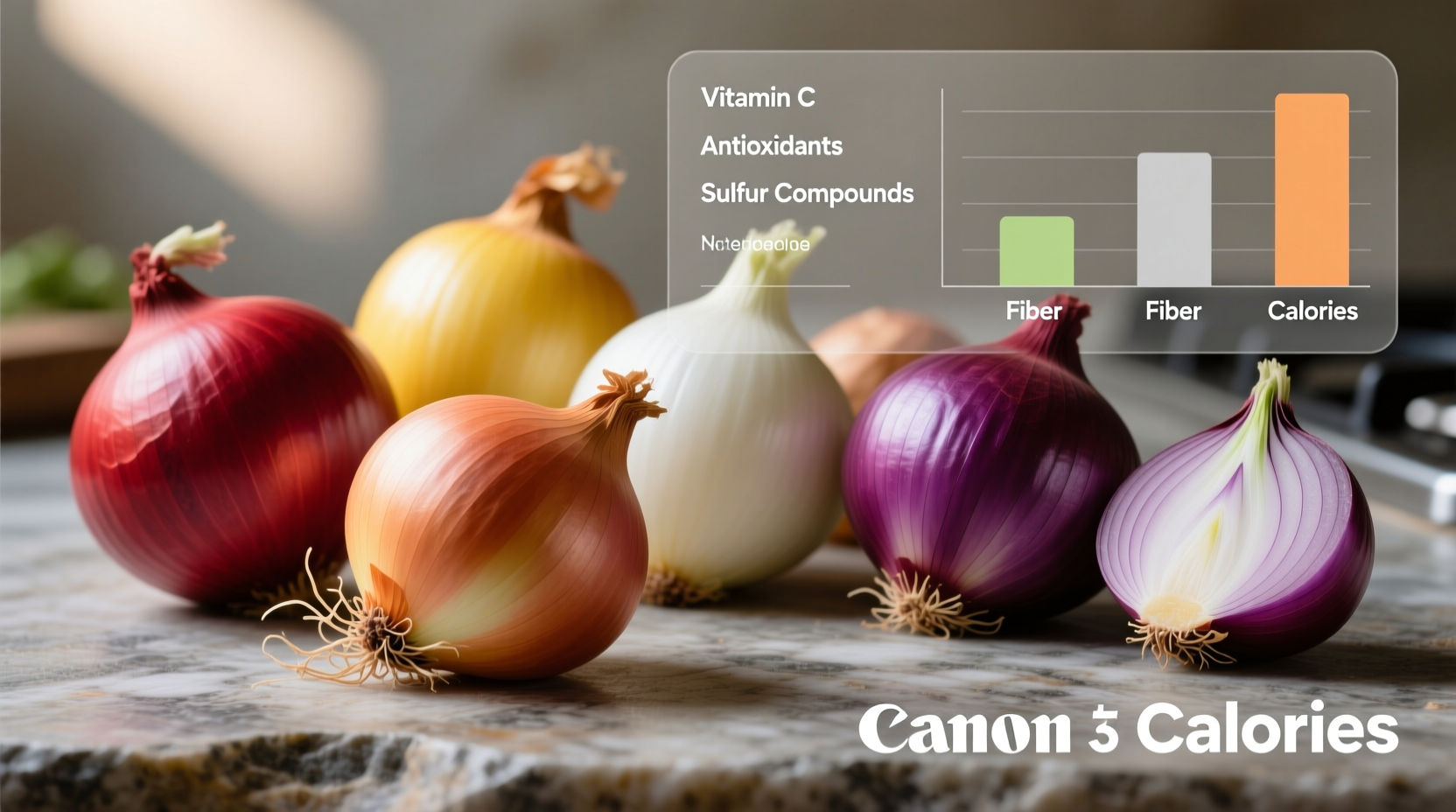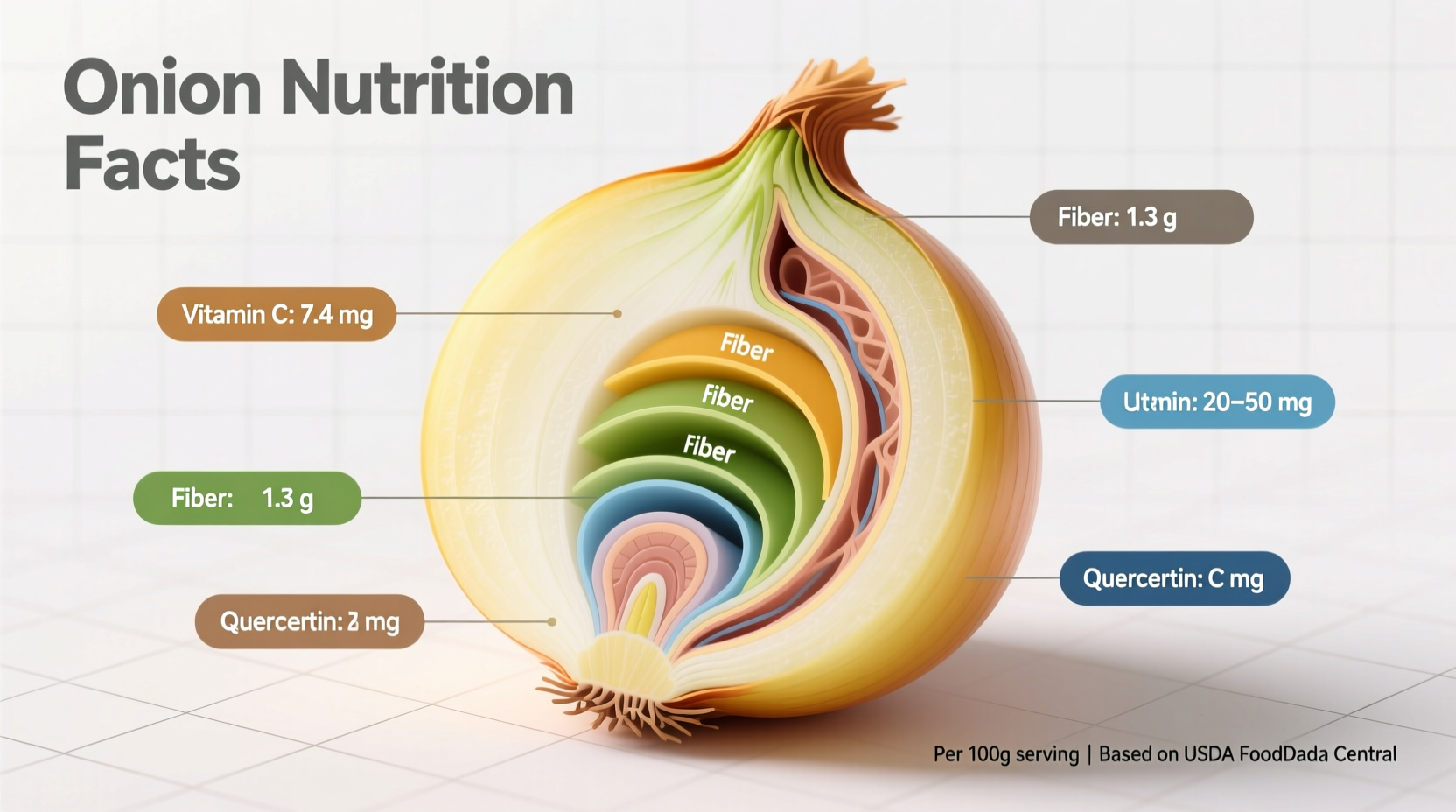One medium onion (110g) contains just 44 calories, 10g of carbohydrates, 1.9g of fiber, and delivers 11% of your daily vitamin C needs. Onions are rich in antioxidants like quercetin and sulfur compounds that support heart health, blood sugar regulation, and inflammation reduction according to USDA and NIH research.
Discover exactly what makes onions a nutritional powerhouse in your kitchen. Whether you're managing blood sugar, boosting immunity, or simply looking to enhance your meals with nutrient-dense ingredients, understanding onion nutrition can transform your approach to healthy eating. This comprehensive guide delivers science-backed facts you can trust and practical ways to maximize the health benefits of this versatile kitchen staple.
The Complete Nutritional Profile of Onions
Onions might seem simple, but their nutritional composition offers remarkable health benefits. Let's examine the detailed nutritional breakdown that makes onions valuable for your diet.
| Nutrient | Amount per 100g | % Daily Value | Key Health Benefits |
|---|---|---|---|
| Calories | 40 kcal | 2% | Low-energy density for weight management |
| Carbohydrates | 9.3g | 3% | Provides sustained energy |
| Dietary Fiber | 1.7g | 6% | Supports gut health and digestion |
| Vitamin C | 7.4mg | 8% | Boosts immune function and skin health |
| Vitamin B6 | 0.12mg | 7% | Supports brain health and metabolism |
| Folate | 19μg | 5% | Essential for cell growth and function |
| Potassium | 146mg | 4% | Regulates blood pressure and fluid balance |
| Manganese | 0.13mg | 6% | Supports bone health and metabolism |
This nutritional profile comes directly from the USDA FoodData Central, the official U.S. government database for food composition. Onions contain virtually no fat and are naturally cholesterol-free, making them an excellent addition to heart-healthy diets.
Science-Backed Health Benefits of Onions
Onions deliver more than just flavor—they offer specific, research-supported health advantages that make them worth incorporating into your regular diet.
Powerful Antioxidant Properties
Onions rank among the top vegetable sources of quercetin, a flavonoid antioxidant with impressive health benefits. According to research published in the National Institutes of Health database, quercetin helps combat oxidative stress and inflammation throughout the body. Red onions contain particularly high levels—up to 11 times more quercetin than white onions.
Heart Health Support
The sulfur compounds in onions, particularly allicin, contribute to cardiovascular protection. A 2020 review in Nutrients journal found that regular onion consumption correlates with reduced blood pressure and improved cholesterol profiles. These compounds help prevent blood clots and reduce inflammation in blood vessels.
Blood Sugar Regulation
For those managing blood glucose levels, onions offer specific benefits. Research from the National Center for Biotechnology Information indicates that onion extract can significantly lower fasting blood sugar levels. The chromium content in onions also enhances insulin sensitivity.
How Onion Varieties Compare Nutritionally
Not all onions deliver identical nutritional benefits. Understanding the differences can help you select the right variety for your health goals.

Red Onions: The Antioxidant Champion
Red onions contain anthocyanins, the same pigments found in blueberries and red cabbage. These compounds give red onions their distinctive color and boost their antioxidant capacity significantly. Studies show red onions have 4-5 times more total antioxidants than yellow or white varieties.
Yellow Onions: The All-Purpose Nutritional Choice
Yellow onions (also called brown onions) represent the most commonly used variety in cooking. They offer a balanced nutritional profile with moderate levels of quercetin and sulfur compounds. When caramelized properly, yellow onions develop additional beneficial compounds through the Maillard reaction.
White Onions: Mild Flavor, Specific Benefits
White onions contain slightly less quercetin than yellow or red varieties but offer higher levels of certain sulfur compounds. They're particularly beneficial for digestive health due to their prebiotic fiber content, which feeds beneficial gut bacteria.
Maximizing Onion Nutrition: Practical Kitchen Strategies
How you prepare and consume onions significantly impacts their nutritional benefits. These evidence-based techniques help you get the most from this versatile vegetable.
Cutting Technique Matters
Allow cut onions to rest for 10-15 minutes before cooking or eating. This resting period activates the enzyme alliinase, which converts precursor compounds into beneficial sulfur compounds like allicin. The same principle applies to garlic—letting it sit after cutting enhances its health properties.
Cooking Methods That Preserve Nutrients
While raw onions deliver maximum quercetin, certain cooking methods actually increase the bioavailability of other beneficial compounds:
- Light sautéing: Preserves most nutrients while making onions more digestible
- Roasting at moderate temperatures (350°F/175°C): Enhances antioxidant activity
- Avoid boiling: Causes significant nutrient loss into cooking water
Pairing Onions with Complementary Foods
Combine onions with these foods to boost nutritional absorption:
- Vitamin C-rich foods (like bell peppers): Increases iron absorption from plant sources
- Healthy fats (olive oil, avocado): Enhances absorption of fat-soluble antioxidants
- Other allium vegetables (garlic, leeks): Creates synergistic health effects
Understanding Onion Nutrition Limitations
While onions offer impressive health benefits, it's important to understand their context boundaries—when their nutritional advantages apply and when they might not be appropriate.
Digestive Sensitivity Considerations
Onions contain FODMAPs (fermentable carbohydrates) that can trigger digestive discomfort in sensitive individuals, particularly those with irritable bowel syndrome (IBS). According to Monash University's research on FODMAPs, red onions tend to be better tolerated than white or yellow varieties for some people. If you experience digestive issues, try cooking onions thoroughly or using the green tops (scallion parts), which contain fewer FODMAPs.
Nutrient Bioavailability Factors
The nutritional benefits of onions depend on several factors:
- Storage conditions: Onions stored at room temperature maintain nutrients better than refrigerated ones
- Preparation method: As mentioned earlier, cutting technique affects beneficial compound formation
- Individual metabolism: Genetic variations affect how people process onion compounds
Realistic Expectations for Health Impact
While onions contribute to a healthy diet, they're not a magic solution. The National Institutes of Health emphasizes that no single food can prevent or cure disease. Onions work best as part of a diverse, plant-rich diet rather than as a standalone remedy.
Evolution of Onion Nutrition Science
Our understanding of onion nutrition has evolved significantly over time, reflecting advances in nutritional science and analytical techniques.
In the 1980s, research primarily focused on onions' vitamin C content and basic mineral composition. By the 1990s, scientists began identifying specific flavonoids like quercetin in onions. The early 2000s brought recognition of sulfur compounds' health benefits, particularly for cardiovascular health.
Recent research (2015-present) has expanded our understanding of onions' prebiotic effects on gut microbiota and their potential role in cancer prevention. Advanced analytical methods now allow researchers to measure specific compounds and their metabolic effects with greater precision.
Common Onion Nutrition Myths Debunked
Let's address some persistent misconceptions about onion nutrition with evidence-based facts.
Myth: Cooking destroys all onion nutrients
Reality: While some heat-sensitive nutrients decrease with cooking, others become more bioavailable. Research shows that moderate cooking actually increases the antioxidant activity of certain onion compounds. The key is using appropriate cooking methods—steaming or light sautéing preserves more nutrients than boiling.
Myth: All onion varieties offer identical nutritional benefits
Reality: Different onion colors indicate varying phytochemical profiles. Red onions contain anthocyanins not found in white onions, while yellow onions typically have higher quercetin content. Each variety offers unique nutritional advantages.
Myth: Onion supplements provide the same benefits as whole onions
Reality: Whole onions deliver a complex matrix of nutrients and fiber that work synergistically. Supplements typically isolate single compounds, missing the comprehensive benefits of consuming the whole food. The National Institutes of Health recommends obtaining nutrients from whole foods whenever possible.
Practical Applications for Your Health Goals
How can you strategically incorporate onions to support specific health objectives?
For Heart Health
Include ½ cup of lightly sautéed onions daily in your meals. Pair with olive oil and tomatoes for a Mediterranean-style approach that maximizes cardiovascular benefits. The sulfur compounds in onions work synergistically with lycopene from tomatoes for enhanced heart protection.
For Blood Sugar Management
Add raw red onions to salads and sandwiches. The chromium and quercetin in raw onions help improve insulin sensitivity. Aim for ¼ to ½ cup of raw onions with carbohydrate-containing meals to moderate blood sugar response.
For Immune Support
Combine raw onions with vitamin C-rich foods like citrus or bell peppers. This pairing enhances the absorption of both nutrients. Try adding thinly sliced red onions to orange and avocado salads for a powerful immune-boosting combination.











 浙公网安备
33010002000092号
浙公网安备
33010002000092号 浙B2-20120091-4
浙B2-20120091-4